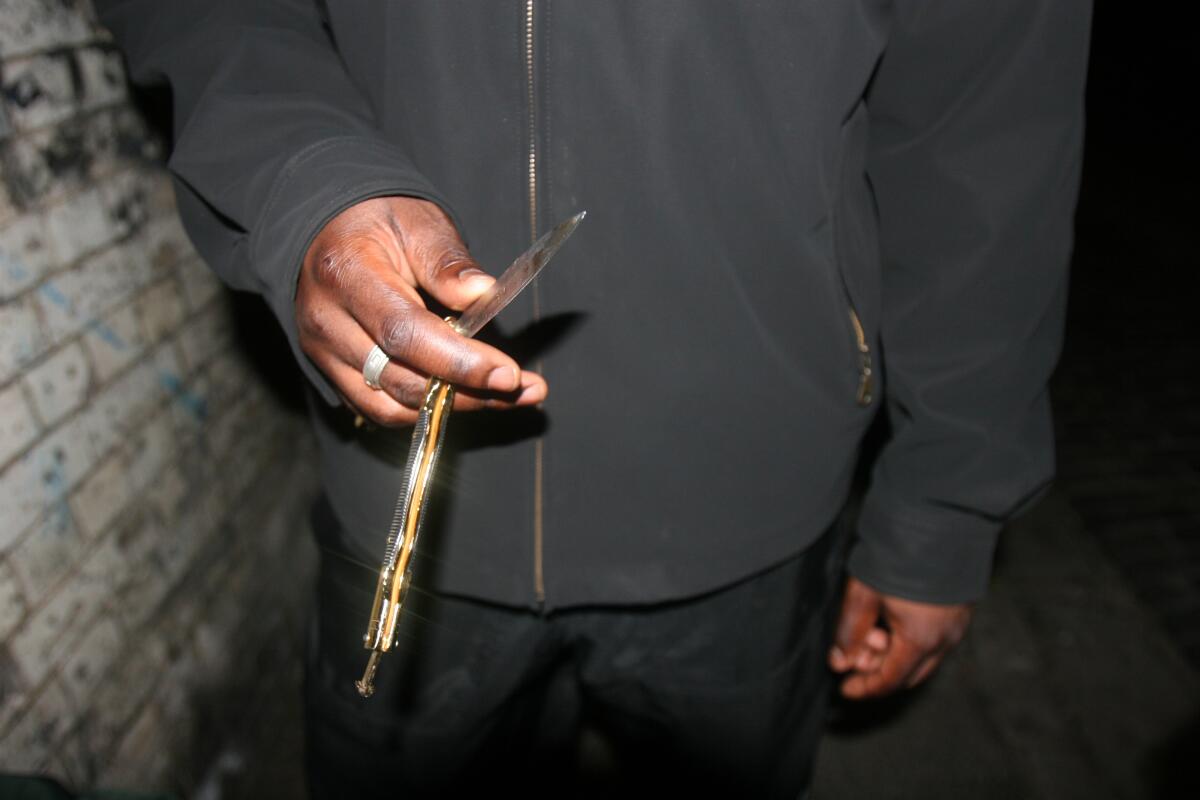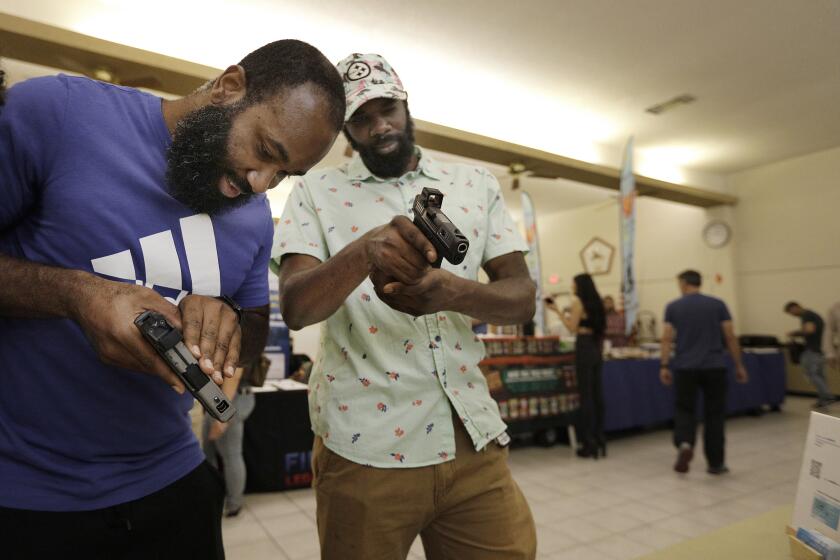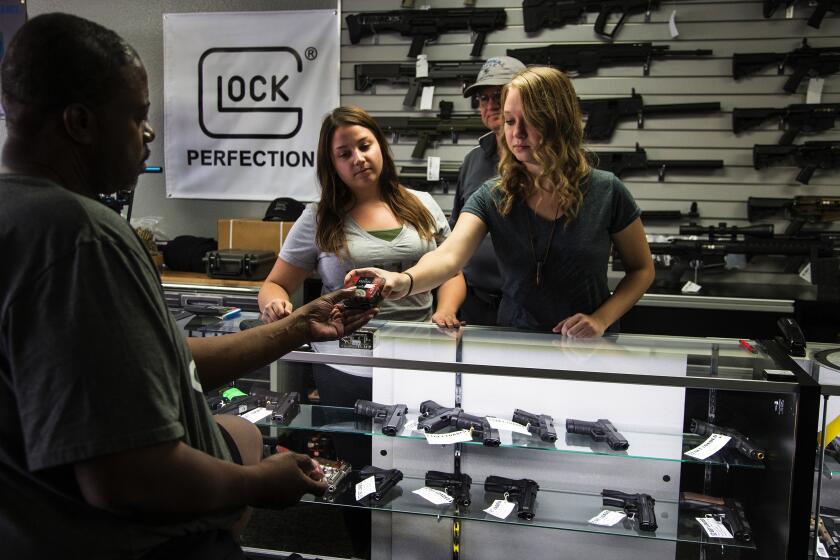Billy clubs? Butterfly knives? Legal shift on 2nd Amendment affects more than just guns

- Share via
In 2021, U.S. District Judge Roger T. Benitez ruled that a 100-year-old California ban on stick-like weapons known as “billy clubs” was constitutional precisely because it was so “longstanding.”
Last week, Benitez, reviewing the case for a second time, ruled the opposite: The ban is unconstitutional because it isn’t old enough.
“What is different today,” the judge wrote, “is that a statute enacted in 1923 is no longer given a pass for being ‘longstanding.’ ”
Benitez’s reversal was the latest example of the rapidly shifting landscape for 2nd Amendment law in the country — not just for firearms, but all sorts of other weapons. Beyond billy clubs, laws banning butterfly knives, switchblades and other edged weapons are also being challenged.
In the 2022 case New York State Rifle & Pistol Assn. vs. Bruen, the U.S. Supreme Court said that state restrictions on the 2nd Amendment are legitimate only if they are deeply rooted in American “history and tradition” or closely analogous to some other historic law.
To be relevant under such an analysis, the high court said, a law or similar prohibition would have to date back to either 1791, when the 2nd Amendment was adopted, or 1868, when the 14th Amendment and its related due process protections were adopted.
The gun industry claims a victory after a federal judge blocks a California law allowing suits against makers and sellers of ‘abnormally dangerous’ firearms.
The ruling shook American jurisprudence around firearms to the core. It prompted challenges to state gun laws to be filed all over the country, and revived many other weapons cases that had been failing to gain traction in the courts.
Benitez — a George W. Bush appointee lovingly referred to as “Saint Benitez” by gun rights supporters — has previously struck down various California gun laws in light of the Bruen decision, including the state’s bans on assault-style weapons and high-capacity magazines.
The state is appealing those decisions, and California Atty. Gen. Rob Bonta’s office promptly notified the court that it would be appealing the billy club ruling, too, which it said in a statement “defies logic” and “contradicts” the Bruen decision in a way that “puts public safety at risk.”
As the case makes clear, the standard set by Bruen is reaching far beyond rifles and handguns.
“The 2nd Amendment protects a right to bear arms,” said Adam Winkler, a UCLA law professor focused on 2nd Amendment law, “and the Supreme Court has made it clear that that is not limited to firearms.”
Across the U.S., state laws bar a plethora of weapons, from blades to blunt instruments.
All are now fair game for toppling in the eyes of gun rights and other weapons enthusiasts, who view any restriction as an infringement on their right to bear arms.
Legal cases concerning weapons other than firearms present some distinct issues, but largely now hinge on the same Bruen-inspired historical analyses that gun cases rely on, experts said. Lower district and appellate court judges are still grappling with the Bruen test and how to apply it, the experts said, leaving the legal landscape unsettled.
“Bruen is so inherently ambiguous, and the [history and tradition] test so unfamiliar to judges, that there are just fundamental disagreements,” Winkler said. “It’s wholly foreign to the courts to look solely to history and tradition to determine the scope of government’s regulatory power, and they don’t really know how to do it.”
In August, a conservative three-judge panel of the U.S. 9th Circuit Court of Appeals ruled that a 30-year ban on butterfly knives in Hawaii was unconstitutional in light of Bruen, threatening such laws not just in Hawaii but in California and across the country.
“Hawaii has not demonstrated that its ban on butterfly knives is consistent with this Nation’s historical tradition of regulating arms,” Judge Carlos Bea, an appointee of President George W. Bush, wrote for the court.
After the U.S. Supreme Court ruling on modern gun laws, California cited precedents involving enslaved people and other minorities in defending background checks.
Butterfly knives have split handles that swing back to form a single handle when the blade inside is revealed. Hawaii and other states that ban them, including California, have argued they present a particular public danger, and that there are historic laws outlawing particularly dangerous blades to justify restrictions under Bruen.
Late last week, the 9th Circuit said that it was taking the case back up to be reconsidered by a larger, 11-judge en banc panel. Such a decision suggests that at least some of the courts judges also question whether the law under Bruen was appropriately applied in the case.
Benitez’s latest ruling on billy clubs also faces further review.
Such weapons have been poorly defined in state law but broadly construed in the past to include the sort of swinging batons once popular among police, as well as other wooden clubs, bats and batons.
Benitez found that such weapons have long been used for self-defense, and that in the relevant historical eras under Bruen, there were no sufficiently similar bans on them. Therefore, California’s ban is unconstitutional and cannot be enforced, he ruled.
“One can easily imagine countless citizens carrying these weapons on daily walks and hikes to defend themselves against attacks by humans or animals,” Benitez wrote. “To give full life to the core right of self-defense, every law-abiding responsible individual citizen has a constitutionally protected right to keep and bear arms like the billy for lawful purposes.”
Bonta’s office said the ruling, if allowed to stand, would legalize in California modern, steel batons that telescope into themselves and can be easily concealed and “used in public disturbances or riots,” as they were during the Jan. 6, 2021 attack on the U.S. Capitol.
A California law requiring people to submit to a background check each time they want to purchase ammunition is unconstitutional, a federal judge ruled.
“The Supreme Court was clear that Bruen did not create a regulatory straitjacket for states — and we believe that the district court got this wrong,” Bonta’s office said. “We will not stop in our efforts to protect the safety of communities.”
Alan Beck is counsel for the plaintiffs in both the California billy club case and the Hawaii butterfly knife case. He called California’s billy club ban “a very vague and nebulous law that has been abused for decades in California.”
Beck said the law has been cited by police and prosecutors to charge people for carrying a table leg and a skateboard, and clearly ran afoul of the history test under Bruen.
“It’s common sense that the colonial era didn’t ban people from carrying sticks around or owning sticks in their house,” he said.
He said such laws are clearly unconstitutional because there “are a lot of people who aren’t comfortable carrying a firearm, who would like some mechanism for self-defense.”
Benitez made a similar point in his ruling last week, where he described a theoretical “young girl” being arrested for carrying a billy club while walking home from school in “a part of town where robberies, assaults, and rapes have occurred; where youth gangs are known to frequent; and where unrestrained dogs are known to roam.”
“And why does California elect to make this girl a criminal? Because there is a risk, no matter how small, that the girl might use [the club] for an unlawful purpose, or that others may use similar weapons for unlawful purposes,” Benitez wrote. “The United States Constitution prohibits such intrusions into an otherwise law-abiding citizen’s choice for self-defense.”
More to Read
Sign up for Essential California
The most important California stories and recommendations in your inbox every morning.
You may occasionally receive promotional content from the Los Angeles Times.

















